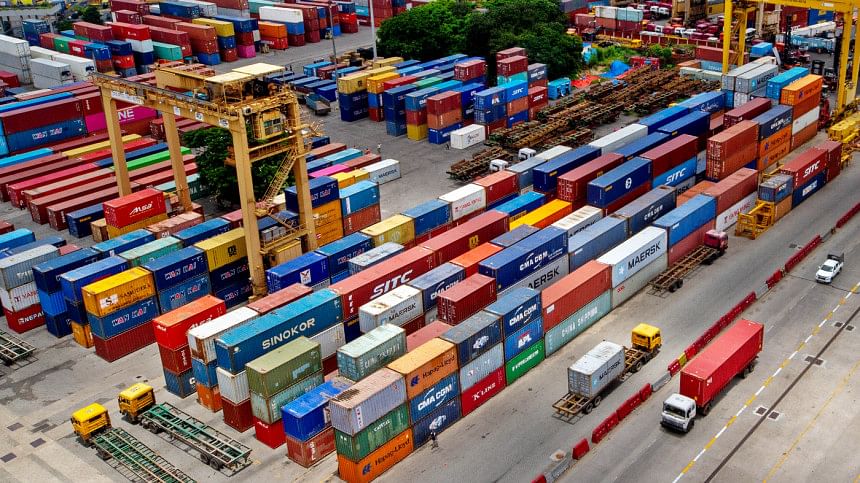Long vessel queue forms at Ctg port

A long queue of vessels has formed at the Chattogram port's outer anchorage, with berthing delayed by up to nine days, for container yards being acutely congested and operational disruptions resulting from the quota reform movement last week.
At least 13 container vessels were waiting to berth as of the afternoon today as others were held up at jetties for being unable to unload imports due to space constraints at the yards.
Delivery of imports from the yards resumed on the evening of July 23 after almost five days of countrywide unrest and curfew, but the pace was slow as the roads were choked with trucks entering to receive containers.
There were 35,421 TEUs (twenty feet equivalent units) of full container load (FCL) shipments, meaning containers entirely occupied by a single shipper's goods, at the import yards till today morning.
This is over 88 percent of the yards' capacity to store 40,368 TEUs.
Such space constraints are now forcing vessels to remain at the jetties for anywhere from three to five days whereas usually a vessel can leave within 48 hours on discharging imports and taking exports on board.
And this has led to the long queue of incoming vessels.
For instance, Panama-flagged MSC Qingdao arrived at the outer anchorage on July 21 and was yet to get berth as of today.
SOL Resilience and SOL Reliance arrived from Colombo and Singapore respectively on July 26 and their local agent estimates that berthing would not be possible before July 31.
Port users, mainly officials of different firms operating ships, identified three major reasons for vessels having to stay longer periods at the jetties.
Firstly, shipping agents were unable to promptly receive import discharge permissions as they could not share documents, including details of shipment contents, with the authorities for a five-day internet blackout.
Similarly, Chittagong Port Authority could not access the naval authority's approvals for the unloading of dangerous cargo.
Secondly, deliveries were suspended for the unrest and curfew in the port city, leading to the severe space constraints at the yards and subsequently barring the unloading of containers from vessels.
Thirdly, the unrest and curfew also disrupted off-dock operations, preventing the dispatch of export containers and compelling vessel operators to defer scheduled departures.
Such berthing delays are causing firms operating ships to incur losses in charter hire and service failure while also forcing importers to wait for longer periods in getting their cargo.
"We operate our vessels with a specific service commitment, primarily involving mother vessel connections at transhipment ports like Colombo, Singapore and Malaysia," said Muntasir Rubayat, director of Bangladesh Shipping Agents Association.
As such, delayed berthing leads to costs of at least $15,000 to $20,000 per day in charter hire, not to mention the losses from service failures, he said.
"Late arrival of vessels from Chattogram to those ports results in space having to go empty in a mother vessel and then space shortages on the next mother vessel the following week," Rubayat said.
Additionally, delays in reaching garment products to their destinations causes significant losses for Bangladeshi exporters, he added.

 For all latest news, follow The Daily Star's Google News channel.
For all latest news, follow The Daily Star's Google News channel. 



Comments